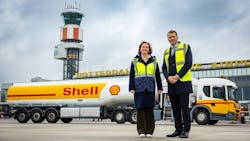Shell and Rotterdam The Hague Airport (RTHA) plan to blend sustainable aviation fuel for all aircraft fueled at the airport starting in 2024.
On top of the European blending mandate of 6%, the airport will accelerate its efforts by setting a minimum target of 8% to meet the more ambitious goal of the Dutch aviation sector of 14% by 2030, the airport reported. Using sustainable aviation fuel (SAF), with help from the new long-term agreement with Shell, is among the key measures currently available to reduce emissions from international aviation.
“Sustainable fuel is essential for the future of aviation,” RTHA CEO Wilma van Dijk stated in a news release. “This long-term agreement makes it possible for Shell to invest in production facilities while allowing airlines to gradually adapt to a new reality.”
The sustainable fuel can lead to a CO2 reduction of 80% across the chain, the companies said. Sustainable fuel also leads to a reduction of soot and ultrafine particle emissions, helping improve air quality.
Shell is building a facility that will produce 820,000 tonnes (903,895 U.S. tons) per year at the Shell Energy and Chemicals Park Rotterdam, which will produce SAF and renewable diesel made from waste, Shell said.
“It’s fantastic to support Rotterdam The Hague Airport on decarbonizing flights through the use of SAF,” added Jan Toschka, Shell Aviation president. “It is particularly encouraging to see an airport committing to long-term SAF agreements, for volumes above the levels required under EU mandates. This type of ambition helps play an important role in providing strong, stable demand that is necessary for scaling up the supply and use of SAF.”
SAF still is more costly than fossil kerosene, and since large-scale production of SAF hasn’t yet taken off, it’s important to phase in additional blending requirements. RTHA chose to sign a long-term deal with Shell to offer transparency on the growth path and cost for the users at the airport, airport officials maintained.
